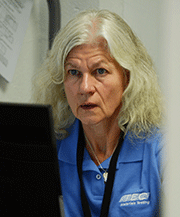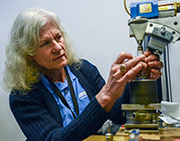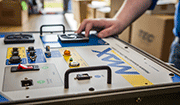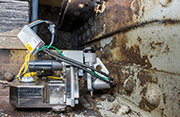E-Archive
Interview
in Vol. 17 - September Issue - Year 2016
Desirable Benefits of Measuring in the Field

Beth Matlock, Senior Materials Engineer in the Materials Testing Division of TEC

Lab measurement services

MAX will be released for production in September 2016

MAX is an ideal system in field operations for large structures that are difficult or impractical to ship
MFN had the pleasure to talk to Beth Matlock, Senior Materials Engineer in the Materials Testing Division of TEC.
(?) MFN: Please tell us about TEC, and what your affiliation with it is.
(!) B. M.: TEC is a high-tech company that was founded in 1975 by three engineers from the University of Tennessee and Oak Ridge National Laboratory. Our mission then was to be a provider primarily to the power generation industry. We now promote four brands in four diverse industries: ACES Systems (Aviation), Powermetrix (Electric Power), Nuclear Products, and Materials Testing (X-ray Diffraction). In all industries, TEC strives to provide simple solutions to complex problems for all of our customers.
I have had the pleasure of being associated with TEC since 1984. My education in Materials Engineering and Materials Science along with my experience in x-ray diffraction and the nuclear industry made for a good match with the early TEC. I feel like we've grown up together. I am proud to be associated with the Materials Testing Lab, which became official in 1989.
We provide x-ray diffraction systems and services to measure residual stress and retained austenite. All of our systems are portable, and our services are accredited by A2LA to Guide 17025. Our first 1610 system was delivered in 1984. We developed our 4000 system in the early 2000s. This system is smaller than the 1610, and has more features compared to the older system. This year we have introduced MAX - Miniature Advanced X-ray System. MAX has many of the TEC 4000 attributes in a much smaller package. This unique system can go inside an 8" orifice and make stress measurements in two to three minutes. It can also measure retained austenite in accordance with ASTM E975, and its extra small size makes it ideal for making measurements in the field outside a controlled laboratory environment. MAX consists of two briefcase-sized cases and a laptop computer. It's self-contained, so all that is needed is a power cord. We expect MAX to be used primarily in field operations where larger portable equipment is not as easy to manage.
(?) MFN: Why would field measurements be helpful or desirable?
(!) B. M.: Field measurements are beneficial in many ways. First, some parts are too large to ship. Imagine trying to stuff miles of pipeline into the back of a pickup. Okay, maybe that's an exaggeration, but obviously large structures are not meant to be moved. Previously, engineers would section pieces out of a large structure and send them to the lab. If the structure didn't have any problems before sectioning, it now had large holes in it that would need to be repaired. When you section a part, you generally alter the stresses to some extent compared to those that existed prior to sectioning. Making measurements on sectioned pieces may not represent the stresses that were in the part originally. If you're able to make measurements in the field, you avoid removing any part of the structure, you don't alter the stress state, and you can measure the total stresses (residual and loading stresses) that exist in the structure. As an added benefit, making field measurements may show that the suspect structure is actually in good shape and does not need to be removed from service.
(?) MFN: Which industries could benefit from this? How?
(!) B. M.: Any industry that has large structures that are difficult or impractical to ship are great candidates for our TEC 4000 and MAX systems or our field measurement services. For example, pipelines and bridges are subjected to loading stresses while being exposed to environmental factors. Stress corrosion cracking (SCC) can be a concern for these structures. Furthermore, there is a direct correlation between tensile residual stresses and SCC when a corrosive agent that would not normally result in failure is present.
Another industry that can benefit from using MAX is the transportation industry. MAX was initially developed under an US Air Force SBIR to allow residual stress measurements in hard-to-access locations on aircraft. By using MAX in these areas, they would be able to determine if the measured structure was still functional or needed to be repaired or replaced. There are two important considerations in this example. First, the residual stresses could be measured coupled with the loading stresses. The total stresses are important in assessing the viability of the part while in service. Secondly, if the stress state is acceptable, there is no need to go through the expense of dismantling the aircraft to remove the good part. MAX saves time and money by being able to identify these good parts. MAX can also save money by identifying defective or unsafe components.
Within the transportation industry, rail, trucking and automotive companies all benefit from measuring residual stresses. These industries also have at least one application that benefits from measuring retained austenite. Retained austenite is a phase in steel that can affect the functionality of the part. Components, such as bearings, require close dimensional tolerances and a limited amount of retained austenite. The TEC 4000 and MAX can measure the presence of retained austenite down to 0.5% precisely.
At TEC, we've had the opportunity to provide field measurement services to various elements of the electric utility industry. These ventures range from measuring turbines in a power generation plant, to gears from a wind power application, to internal structures under a dam at a hydroelectric plant.
Our field measurement team is not limited to terrestrial or sub-terrestrial applications. We have worked with NASA to measure various components of the space shuttle and the International Space Station. We were able to stay on Earth, while the components we measured ventured into space successfully.
(?) MFN: What products and services does TEC offer which could help with field-testing?
(!) B. M.: As I have mentioned, we offer the TEC 4000 and MAX systems for residual stress and retained austenite measurements. These systems work equally well in the laboratory or in the field. For those customers that prefer to use our services, we offer an A2LA-accredited laboratory in Knoxville, TN. Again, we can travel to your site for those large, permanent structures or for company-sensitive components that don't need to leave your custody. Whether you use our systems or our services, the TEC Materials Testing Laboratory can provide a solution to your measurement needs. Not only can large parts be measured non-destructively, but the measurements can be made quickly and easily, generally from 2 to 15 minutes per measurement.
Our systems are easy to operate. The visual feedback often makes it simple to determine if the measurement has been done correctly and the results are valid. Operators do not need to have a background in materials or mechanical engineering to be able to correctly assess the information from our systems. Also, the systems are rugged and reliable. Our first system, which is now 34 years old, is still in operation. The systems that have been in a field operation have survived harsh environments. These environments ranged from 100?-plus temperatures with 100% humidity to sub-zero temperatures and snow.
Our expert team is also an important factor in testing. Our experience and knowledge can help guide you in your field measurements. We have designed and developed our systems with the technology and the customer in mind. Since we have extensive experience in making residual stress and retained austenite measurements, we are a valuable resource in making and interpreting the measurements. We can guide you in where and how to make the measurements, along with helping you to understand the significance of the results.
(?) MFN: How can these products and services help your customers?
(!) B. M.: Residual stress and/or retained austenite measurements are critical to industries that use metals and ceramics. Our systems and services have typically been used for design, process control, quality control, research and development, and failure analysis. The x-ray diffraction technique is an excellent comparison tool that can provide a wealth of metallurgical information beyond the residual stress or retained austenite measurement. Our customers have used our systems and services to effectively design higher strength, lower weight components. They can compare the new and old designs to better understand performance in the new components. They can monitor the stresses and/or retained austenite in parts being produced to quickly know when production equipment needs repair or replacement. Finding faulty parts early in the production process can save substantial amounts of time and money along with improving product reliability and customer satisfaction. Our products and services are an important tool in efficiently producing a superior product and monitoring the service life.
(?) MFN: Where can we find more info?
(!) B. M.: Information is available at our website, www.tec-materialstesting.com. We can also be reached by phone at 865-966-5856. We would love the opportunity to talk with you to help you determine the best way to measure residual stresses and/or retained austenite. We are located at 10737 Lexington Drive in Knoxville, TN, and welcome your visits to our laboratory.
MFN would like to thank Beth Matlock for this interview!
For Information:
TEC / Materials Testing Division
10737 Lexington Drive
Knoxville, TN 37932 USA
Tel. + 1.865.966 5856
Fax + 1.865.675 1241
E-mail: info@tecstress.com
www.tecstress.com



























